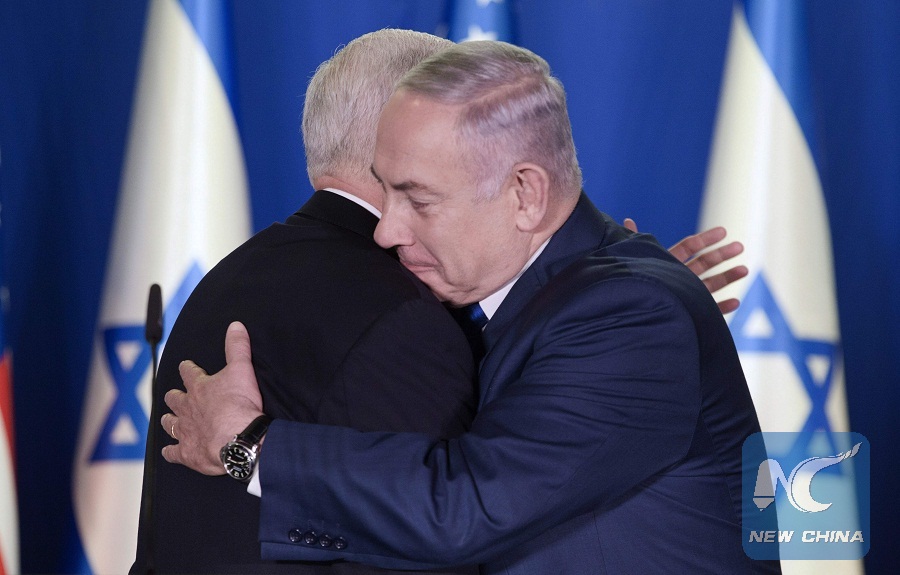 US Vice President Mike Pence (L) and Israel's Prime Minister Benjamin Netanyahu hug on January 22, 2018 in the Prime Minister's residence in Jerusalem. (AFP Photo)
US Vice President Mike Pence (L) and Israel's Prime Minister Benjamin Netanyahu hug on January 22, 2018 in the Prime Minister's residence in Jerusalem. (AFP Photo)
JERUSALEM, Jan. 23 (Xinhua) -- The visit by U.S. Vice President Mike Pence to Israel has brought nothing hopeful for the worsening Israeli-Palestinian conflict, despite the high-profile pledge of stronger alliance between the two countries.
Pence reiterated what U.S. President Donald Trump announced last month: the U.S. recognizes Jerusalem as the capital of Israel, while Israeli Prime Minister Benjamin Netanyahu sat and listened, wearing a broad satisfied smile on his face.
Pence also said the U.S. planned to move its embassy to the holy city by the end of 2019.
"This is more concrete than we have ever heard before, but in the last year, the difficulty of the Trump administration to implement any policies makes me skeptical that this is anything more than a declaration of intent, albeit an honest one," said Ronny Regev, an historian from the Hebrew University in Jerusalem.
While the majority of Israelis view Jerusalem as their capital, the Palestinians want the eastern side of the city as the future capital of their state. International consensus sides with them, leaving the U.S. and Israel in a minority.
But that consensus is not getting the Palestinians anywhere so far.
The only refreshing thing is that both sides are now engaging in fervent diplomatic activity to rally as many supporters as they can with much less violence.
Palestinian President Mahmoud Abbas has repeatedly said he is against violent resistance.
"Opposition is not measured by violence only," says Daoud Kuttab, a Palestinian journalist and director general of Community Media Network.
During Pence's speech in the parliament, Arab-Israeli lawmakers were forcibly banished from the plenum as they raised flags calling Jerusalem the capital of Palestine. Still, Pence received several standing ovations.
"Under President Trump, the United States of America remains fully committed to achieve a lasting peace between Israelis and Palestinians," the vice president said.
On the other hand, the Palestinians have been boycotting the Pence visit, as they believe the Americans can no longer serve as an honest broker in the negotiations between the two sides.
"In the past, Israelis and Palestinians saw the U.S. as a neutral side, a side that did not take a unilateral position and now this is not the case at all," said Hadas Cohen, a political scientist from the Hebrew University in Jerusalem.
"The Americans are unequivocally supporting Israel and this is very problematic. With this support, they waivered their position as a neutral side that can help reach a compromise," she noted.
When Pence visited Jerusalem, Abbas was in Brussels meeting with EU foreign policy chief Federica Mogherini.
At a press conference after a meeting of the EU Foreign Affairs Council, however, Mogherini mentioned, more than once, that she still sees the U.S. as a central player in future negotiations.
"We ask EU member states to swiftly recognize the state of Palestine. We confirm that there is no contradiction between recognition and resumption of negotiations," Abbas told the media.
Israel has condemned the unilateral recognition of the Palestinian state as has been done by several countries. Reports in the Israeli media have said there are several European countries planning to recognize the State of Palestine in the near future.
"The ball is now in the European court," Cohen noted.
But for Netanyahu's government, it always views the EU as largely hostile to Israel.
The Trump administration is reportedly preparing a draft peace plan for both sides, but does it really stand a chance in the light of the latest developments?
"If it (the plan) includes others and if it is fair and just and in sync with international law and reality, then yes," Kuttab told Xinhua.
Of course, each side defines what is fair and just differently.
For a brief moment during the Pence speech, Netanyahu stopped smiling when the American vice president mentioned the two-state solution.
Long believed to be the only solution to the Israeli-Palestinian conflict, the Trump administration shuffled the cards by stating it was not sure if it was the only path to take.
While the international community largely supports a Jewish and Palestinian state co-existing side by side, the commitment of the Netanyahu government to the two-state solution is far from solid, as the continued settlement building in the West Bank, among others, suggest that the Israeli leader is not interested in Palestinian statehood.
"The two-state solution was off the table and suddenly it's on the table again. This demonstrates what is happening in Washington: there is no consistency in the administration's position," Cohen said.
Nonetheless, the parameters and rules of engagement between Israelis and Palestinians are changing despite the indistinct end result.
"We have to find a way to build trust between the two peoples," Israeli President Reuven Rivlin told Pence early Tuesday.
"We are destined to live together," the Israeli president noted.

